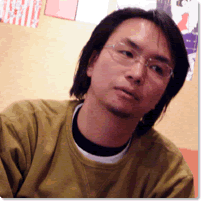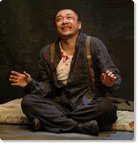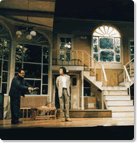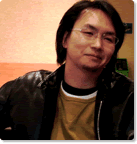- What led you to start Asagaya Spiders as a production unit?
- I had worked within the context of a theater company before that and had begun to feel the limitations of what could be done in that environment. In the case of a movie, actors are selected on the basis of the role they will play and I though the same system could be applied to theater. That led me to begin working in the role of producer. My plays begin with a basic script that I write, and then play is developed from there through on-the-scene discussions, during which our two actors [Yuichiro Nakayama and Satoru Date] can make suggestions to the invited actors that we bring in for each production. They can take my play from the standpoint of actors and show the invited actors how parts might be acted out, without my having to make explanations. In that way the development work on stage moves along very well and the play begins to take shape. They [Nakayama and Date] also get new inspiration from the invited actors. If there were a unit of five or six people, I don’t think things would proceed so smoothly. There is something good about the balance of a three-person unit. And, part of the reason is also that we try not to tie each other down. What’s more, we are always bringing in new actors is interesting for our audience as well. So, I feel that Asagaya Spiders would not have continued to function this long if it was not a unit of three.
- Earlier, you say you worked in the [theater] company format.
- Yes, but it didn’t work out. It wasn’t a stimulating experience for me because I was there being a big fish in a little pond and always in the position where I had to be No. 1. Now I can work in a situation where I am constantly receiving inspiration from a number of people.
- You write and direct and you also act. What was your original desire?
- I wanted to be an actor, and in order to give myself good roles to play, I started writing (laughs). Just after I entered college I rented a small theater named Kagurazaka Die Pratze and got together with my class mates, who had been involved in sports club activities in high school and had them do a play I wrote. People liked that play more than I had expected. And, listening to the audiences laugh made me feel good. I started to think that writing could be interesting too. So, I thought I would enter the college theater company, but it didn’t really look what I wanted. I decided it would be easier to do it myself, so I started my own company.
As for directing, it is only recently that I have started to really enjoy it. I had the feeling that it would be better to leave the directing up to someone else, but it is only in the last five or six years that I have started to enjoy directing. - The first play by another playwright that you directed was The Lieutenant of Inishmore (Japanese title Wee Thomas). Is it different directing another playwright’s work?
- When I am directing one of my own plays my mind is full of things I want to do. But with another person’s play, be it The Lieutenant of Inishmore or The Pillowman, it is like there is one core, one part of the play in my mind that I really want to show. In the case of The Lieutenant of Inishmore (Wee Thomas) I had the feelings “Things go amiss because these are people who are inept in their actions and in expressing themselves” and “They are seeking something like family warmth.” So I decided to believe in that main framework in directing the play. Of course I couldn’t leave out the Irish problem, but I also knew that it was a problem that is hard for the Japanese audience to grasp fully. Almost everything that Martin McDonagh bases his humor and sarcasm on would be lost on a Japanese audience. So, to do this play successfully in Japan I knew I had to perhaps change those jokes.
And, to bring in the element of “warmth” that I wanted, I knew there would have to be blood. So, I spent most of the budget on blood and gunpowder and bodies. I think I was right to do that and it succeeded. I also think I was right to make it intense and not play it for joke value. You can’t make comedy just funny. What both McDonagh’s and my scripts have in common is that they are made humorous but with a deliberate seriousness. If you don’t make the actors dead serious it is not interesting. I obeyed one of the basic rules of comedy, that the actors be dead serious in their comic situation. - Opinion was divided about your use of violence with the acts of the terrorists and the killings in The Lieutenant of Inishmore. What are your thoughts about expressions of violence?
- The plays I saw in high school were supposedly expressions of the pain in people’s hearts at the time, but they always seemed unconvincing to me and I asked myself, “Is that all there is to it?” If you are too pretty in your portrayal of characters, we in the audience who are not living that kind of pretty life will not be interested in it. I think real people are more earthy, unfinished beings. For example, when something makes me feel bad I don’t say, “Well, I guess I’ll put on some dancing music to make myself feel happy.” At times like that, I believe that you should listen to sad music and try to find the “light” in it. But, even if there is a sad tone to the music I offer, that doesn’t mean I don’t want to offer a saving light [to the audience]. I definitely want to offer some kind of salvation. But I believe that salvation in that case comes from finding the light. I don’t like looking at just bright, happy exteriors. I want to see the back side of things too. That doesn’t necessarily involve violence, but at the same time there are stories that violence can’t be left out of.
In the case of The Lieutenant of Inishmore, I liked the feeling of being taken into a strange world where you don’t know what’s happening and there is gunpowder exploding in the theater and it may work and may not and you’re not sure what is going to happen. It’s very tightly and minutely composed and I also think it is good entertainment. - As a playwright, do you think you have something in common with McDonagh?
- When I first read McDonagh’s plays I was very surprised to find something similar to Japan’s small theater plays. I thought that these were plays that would be perfect for us to stage in Japan. There is nothing interesting about putting on a play that will roll by itself once you put it on the rails. In his plays I sensed something in common with our plays in the way that unexpected plot developments keep the tension going. Also, the characters are real (human, not idealized) and portrayed in a very theatrical way. I have no interest in plays that seek to bring everyday conversation to the stage. If I am going to the theater, I want to show characters that are real in a theatrical sense. What I wanted to do with The Lieutenant of Inishmore was to stage it in a way that even for an audience going into it not understanding the Irish liberation movement because it is so different from conditions in Japan, nonetheless, in the course of watching the young Irish characters talking about liberation and seeing them as people, you begin to identify with how they feel and get drawn into their world.
- How about The Pillowman?
- Since it is a story about an author, I believe it must have been written with great effort and soul-searching. It is fascinating because of all the internal pains and joys of the author that come out in the play. With this play, I think McDonagh has reached a new level as a playwright and that was a very stimulating discovery for me. I saw a performance of the play in London and I remember thinking when it was over that what happened in the story was terrible but I still felt saved. There was salvation for me in it. I don’t know if it was when the “green girl” came out or when he didn’t burn the manuscripts, but there was something uplifting for me, and despite being very gritty with raw human emotions, I came to perceive it as fantasy. And that left a very strong impression on me. It may be a dark, heavy and painful play to watch, but in the end you may be surprised to come out with a lightened heart. And, you can leave thinking, “I’ll figure out why I feel uplifted later.” McDonagh doesn’t create characters that are just cruel and heartless. His characters have both front and back sides and he is good at showing the dark side of people. That is what I originally liked about his plays and why I wanted to do stage productions of them. And when I staged this play I did so thinking that I would consider it a success if you could see one ray of light at the end. With The Pillowman I had a much clearer line of thought concerning what I wanted to do compared to The Lieutenant of Inishmore.
After staging McDonagh’s plays I found it very tiring to get back to writing my own plays. I found myself saying, “If McDonagh read this he would probably laugh,” and then I rewrite it. Because we are of the same generation, I find myself thinking, “Since McDonagh has written such powerful scripts, this [that I am writing] is not good enough.” I find that much more often I am asking myself, “Is this good enough?” or “Is this written well enough.” After doing McDonagh’s plays I find that I am reaching for the next level in the plays I write and the characters I create. This has been a very big thing for me. - In your latest work Song of the Devil you take on the theme of World War II. Will you tell us your thoughts about war?
- When I was in elementary school we were shown documentaries about the atomic bomb and it was a terrifying and very dramatic experience for me. In junior high school our teachers were what you would call left-leaning and they told us there are things that are not written in Japan’s history textbooks. They told us about how the Japanese army’s 731 Corps used Chinese for testing chemical weapons. Thanks to that “leftist education” I became negative about Japan. Then, by the time I entered college we were beginning to see Japanese athletes competing overseas, and there would be people in the stands waving the Japanese flag. Those images made me think, “Is this the kind of country we are?” I’d ask myself “What is going on?” And there were a lot of questions that I didn’t have answers for. Is the structure of today’s world determined by the winners and the losers of World War II? Then I began to think, “What would Asia be like today if there had not been a WWII?” My mind was full of a lot of complex questions, and I went to Okinawa to see the war documentation there. And I though about what those people had been fighting for. Surely there was an element of fighting for the country, but I came to the conclusion that these were people with ordinary lives and in the end they were fighting for their families and their loved ones. These were citizens that the countries at the time pulled into the war—just like we would be pulled into a war if it happened today—and I thought that those many ordinary people can’t be negated. We have to admit the wrongs that Japan was responsible in the War and feel sorry for them, but at the same time we must not forget to respect those ordinary people for what they did.
- Now we have the Iraq war and the involvement of Japan as one of the current topics. Is this why you chose to take up the theme of war at this particular time?
- It is not because of the timing (and because this year is its 60th year memorial) but because this is a time I have been thinking about the question of war (not only because. After reaching the age of 27 or 28 I had the clear feeling that I had to deal with the theme of war. Of course there may be a number of influences involved, but if my plays cause people today to think even for a minute about that [WWII] time and to think about how they are living now, it will be worth it for me. If you ask people, “Do you like Japan?” I think they will stop to think about that question.
- In this most recent work you are looking at war not from a historical or ideological perspective but from the point of view of human psychology, aren’t you?
- Yes. The only thing I wanted to do was to portray those people who were there. It was my first trip to Okinawa and I spent all my time going to the war museums, archives and battle sites. For four days and three nights I immersed myself completely in the war. I went to the Kiyan Point where the islanders threw themselves to their death rather than surrender to the American forces when there was nowhere else to run. It is a devastatingly beautiful place. And it was hard to believe that people were killing themselves in such an incredibly beautiful place. But, that is what war is, I realized. The scenery and other thinks no longer matter at all. All I could do was stand there in disbelief, in a state of semi-shock. It was tough.
Rather than presenting your ideas as intellectual arguments, I believe there should be a way in which things take the shape of solid statements in the course of naturally following your direct emotions. Last year I saw a Brit-Pop movie titled Live Forever and it showed me through its tour of the popular music hit charts how the rock musicians were thinking about their country as the governments changed from Thatcher to Majors to Blaire. It was very stimulating for me to see how they faced the political situations and showed where they stood with regard to their country of Great Britain. It was quite a shock for me to realize that what I had been appreciating simply as music also had very political meaning and that these musicians were consciously taking political stances. I want to look at the same types of questions sometimes, and I now believe that is an essential part of creating works. - Do you think that you would like to take your works to the international stage?
- I am very interested to know how foreign audiences would react to the works we are doing on the Japanese small-theater scene. Not necessarily works based on the theme of war like my latest work, but perhaps the kind of family-centered works I have done until now. I am interested to see how those works would be received. If I had the chance I would like to present my works overseas, though I don’t know whether it would be using Japanese actors or foreign actors.
- It seems like the next generation younger than yours is absorbed completely in video games. Aren’t you worried about the future of theater and whether this digital generation will be interested in coming to theaters to see live actors perform plays or eventually carrying on the theater tradition?
- I am very conscious of this, but there is also a possibility that we are seeing only one aspect of the situation. There are young people who are not growing up in that [digital] way, and these are the ones I think we should have expectations for. The mass media loves to say that these games are creating a generation of fools, but there are surely some young people who use games as a means of communication, and there are some who discover through games the desire to be creative. So, I don’t think we can generalize about the effect of gaming. I don’t think you can simply say, “I’m afraid what these people are going to be like when they reach adulthood.”
- Are there any things in particular that you would like to try in the future?
- If I get the opportunity, I would like to try working in film or video. I want to do straight plays as such, but I also want to create the kind of experiential theater where you don’t know what is going to happen. I think it should be possible to do the kinds of things that make people want go to a certain theater in a certain city because they have heard about a unique kind of show going on there, like circus or “De La Guarda” (acrobat or dance shows for stand-up audiences) or “Blue Man Group: TUBES” (a performance group of three men all painted blue in New York). Even if it is on a small scale, I would like to try things like that one day.
Keishi Nagatsuka
Keishi Nagatsuka is a leader of a new generation of contemporary theater artists who finds fantasy in the darker sides of the human character

Keishi Nagatsuka
Keishi Nagatsuka leads the theater production unit “Asagaya Spiders.” While studying at Waseda University in 1994, he formed the theater group “Gekidan Warau Bara” (Laughing Rose Theater Company). After the dissolution of that company, Nagatsuka created the production group “Asagaya Spiders” in 1996 with the desire to do small theater productions using fewer people and not depending on the theater company format. With this group he has been active as playwright, director and actor. He has continued to expand his fields of endeavor to include writing scripts for television dramas and acting in movies while also drawing considerable attention and expectations in the theater world as a progressive director whose activities have included mounting commercial productions of contemporary Irish plays. Besides productions of his own plays, the Asagaya Spiders group has also brought together talented outside actors from the small-theater scene in productions of plays by other playwrights. Nagatsuka’s own works are characterized by depictions of human relationships like between parents and children or lovers with a sense lying somewhere between reality and fiction. In 2004 his play Hataraku Otoko (Working Men) toured nine Japanese cities and drew a total audience of 14,800.
Interviewed by Jo Meguro

Wee Thomas
(original title: The Lieutenant of Inishmore)
Photo by Ryo Sekimura
After its premiere performance by the Royal Shakespeare Company at The Other Place, this play also enjoyed a long run in the West End. In 2003 it won the Laurence Olivier award for Best Comedy. In August of 2003, Keishi Nagatsuka directed a production of it at the Parco Theater in Tokyo. Set on the Irish island of Inishmore, this play created a sensation as a violence comedy in which young members of the Irish Republican Army kill each other in a quarrel that began over a single cat.cha’s New Clothes. Became the youngest ever winner of the Otani Takejiro Award for the Super Kabuki play Shin Sangokushi.
Martin McDonagh
Born in 1971 in London, McDonagh is a playwright who debuted with the work The Beauty Queen of Leenane in 1996, a play based in the Leenane region of Ireland where his parents are from. This work won McDonagh the Evening Standard new writer award and a highly successful production the play in New York in 1998 won four Tony awards. The following works A Skull in Connemara and The Lonesome West completed the playwright’s “Leenane trilogy.” This was followed by the playwright’s “Aran Island trilogy,” of which The Cripple of Inishmaan has been performed in Japan at the Bungaku-za theater with the Japanese title Yume no Shima Inishmaan and in the production of the Major League Inc. under the Japanese title Billy to Helen, and The Lieutenant of Inishmore has been performed under the Japanese title Wee Thomas. In 2003 McDonagh finished a new play titles The Pillowman.

The Pillowman
Photo by Ryo Sekimura
Performed originally as part of the London National Theater repertoire over the period from November 2003 to April 2004. It won the 2004 Laurence Olivier Award for best new play. It is a thrilling black comedy about an author in some authoritarian state who is arrested on the charges that children are being killed one after another by the same means described in the grim stories in author’s children’s books. In the interrogation room where he is being questioned by the detectives, frightening new facts are revealed one after another. As his first work set outside of Ireland, The Pillowman has won McDonagh new acclaim. In November of 2004, Keishi Nagatsuka directed a highly acclaimed production of the play at the Parco Theater in Tokyo that has won several awards.

Song of the Devil


Related Tags

